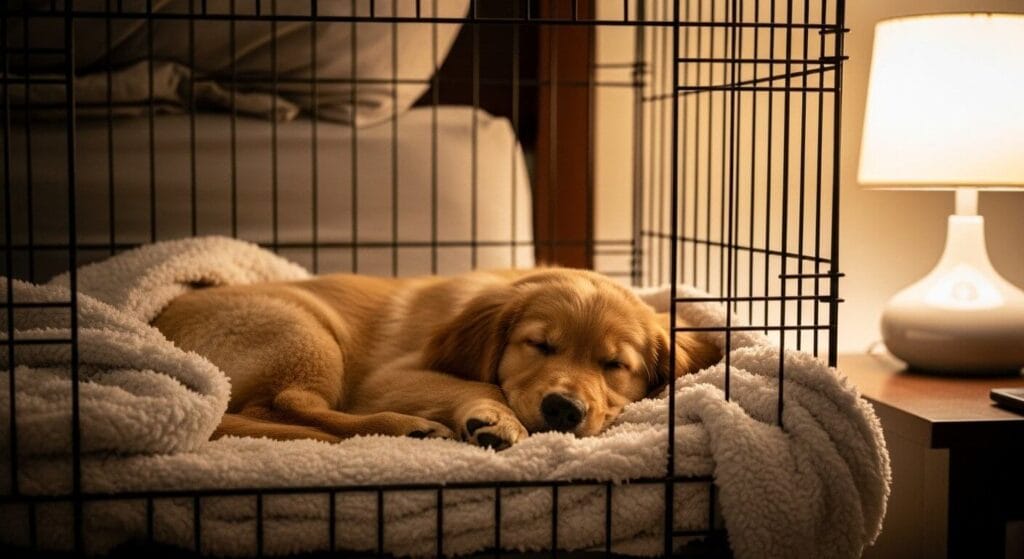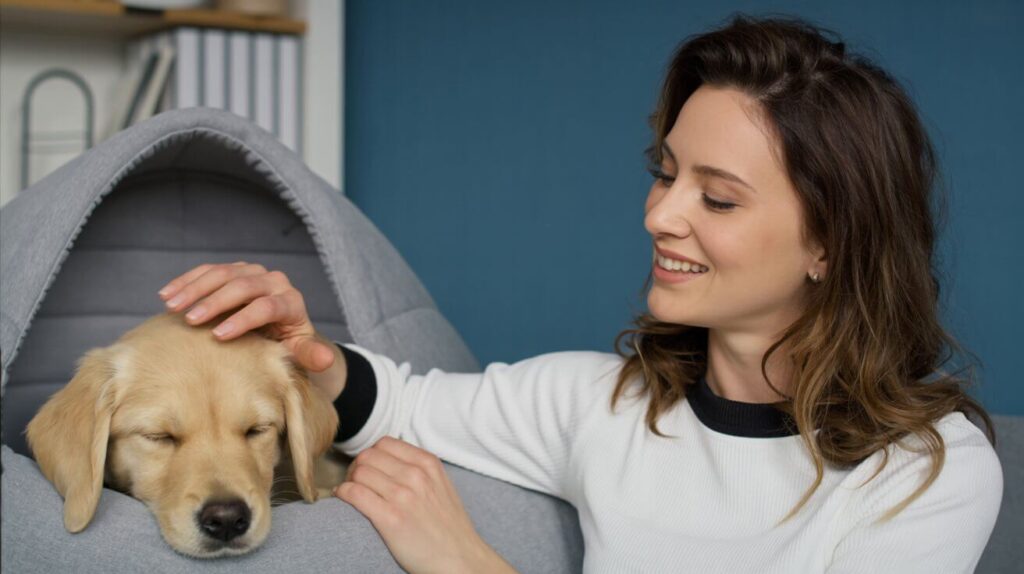That sound is heartbreaking. The high-pitched, desperate cry of a new puppy barking in their crate at night can make you question everything. As a certified trainer, it’s the #1 issue new owners call me about in a panic. You’re sleep-deprived, worried you’re doing something wrong, and desperate for a solution.
I want to reassure you: this is a solvable problem, and the solution does not involve letting them “cry it out.” This guide will give you a humane, step-by-step plan to stop the puppy barking in the crate and teach your new companion to see their crate as a safe, peaceful den.
Smarter Paws Academy is reader-supported. When you buy through links on our site, we may earn an affiliate commission at no extra cost to you. As an Amazon Associate, I earn from qualifying purchases. Thank you for your support!
Important Behavior Disclaimer
This guide is for common puppy adjustment barking. If your puppy is showing signs of extreme, panicked distress (non-stop frantic barking, trying to break out of the crate, self-harm), please consult a qualified veterinary behaviorist or a certified professional dog trainer.
Quick Tips for a Quiet Crate
- Make it a Happy Place: The crate should be a wonderful den, not a punishment. Play crate games and feed meals inside with the door open to build a strong positive association.
- Meet Their Needs First: Before crating, always ensure your puppy has had a potty break, some playtime, and isn’t hungry or thirsty. A fulfilled puppy is a quiet puppy.
- Don’t Ignore Distress: While it’s okay to ignore a few minutes of minor “protest” whining, never let a puppy in genuine, panicked distress “cry it out.” This can create lifelong anxiety.
Prefer to Listen? An Audio Overview
For a conversational deep dive into this topic, press play below for the complete audio discussion.
Runtime: 1 minute 48 seconds
View Full Audio Transcript
Narrator: Welcome to the Smarter Paws Academy audio overview. Today, we’re tackling one of the most stressful issues for new puppy owners: barking in the crate. Sandie, what’s the first thing a sleep-deprived owner needs to hear?
Sandie Calloway: Thanks for having me. The first thing is that you’re not alone, and your puppy is not being bad. They’re a baby in a new place, and barking is their way of communicating. The goal is never to punish the bark, but to understand the reason behind it and teach them that the crate is a safe, wonderful place.
Narrator: So, what’s the most critical step in creating that positive feeling?
Sandie Calloway: It all happens before you even close the door. You have to make the crate the best place on earth. This means playing fun games by tossing treats inside, feeding all their meals in there with the door open, and giving them a special, high-value chew toy that they *only* get when they are in their crate.
Narrator: What about at night, when the crying starts? Should owners ignore it?
Sandie Calloway: That’s the million-dollar question. You have to learn the difference between a little bit of “protest” whining, which is okay to ignore for a few minutes, and real, panicked “distress” barking. You should never, ever let a truly distressed puppy cry it out. That can create lifelong anxiety.
Narrator: So what’s the immediate action plan for a distressed puppy?
Sandie Calloway: First, a calm, boring potty break to make sure that’s not the issue. Second, make sure the crate is in your bedroom. Being able to see and hear you is incredibly reassuring. And third, a tool like a Snuggle Puppy, with a simulated heartbeat, can be a lifesaver for making a lonely puppy feel secure. It’s all about creating a safe, positive experience.
Table of Contents
Why is My Puppy Barking in the Crate?
Your puppy is not being “bad” or trying to manipulate you. They are a baby animal in a new environment, and their barking is a way of communicating a need or an emotion. Before we can find a solution, we have to understand the cause.
- Loneliness or Fear: They’ve just been separated from their mother and littermates. Being alone is new and scary.
- Boredom: They have pent-up energy and no outlet for it in the crate.
- Potty Needs: Their tiny bladder is full, and they are trying to tell you they need to go out.
- Developmental Stages: Teething pain or adolescent fear periods can make the crate feel uncomfortable or scary.
Our entire approach is about addressing these underlying causes with compassion, not punishing the bark itself.
The First Step: Making the Crate a Happy Place
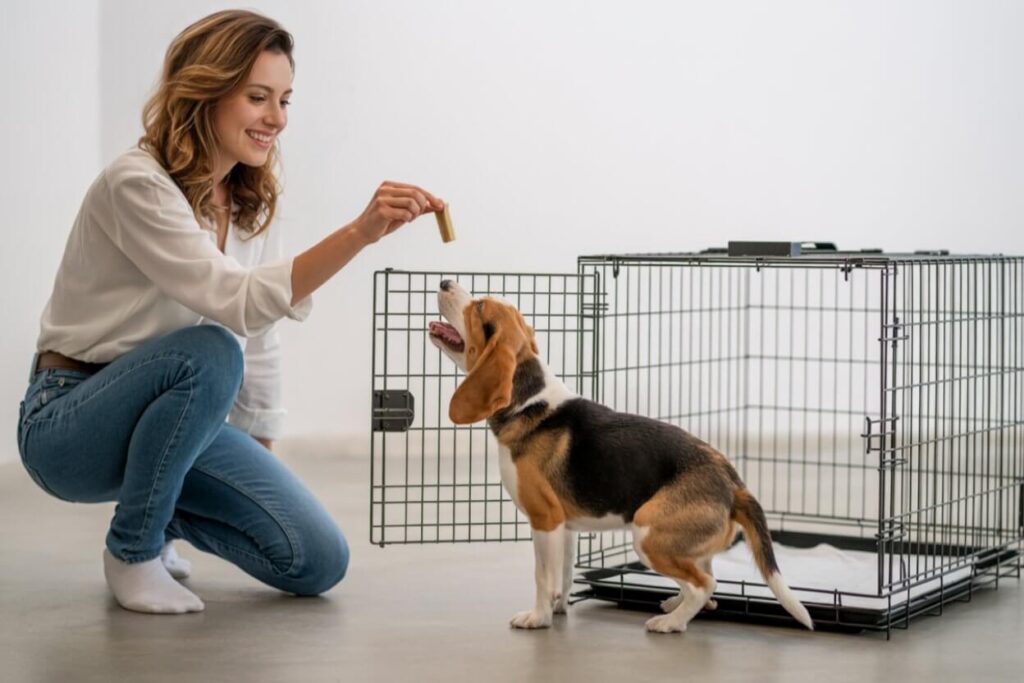
The most important part of crate training happens before you even close the door. Our goal is to build a powerful positive association, teaching your puppy that the crate is their personal, wonderful den. As veterinary experts at UC Davis explain, dogs naturally seek out dens for security. We can use this instinct to our advantage.
The process, as outlined by trusted sources like the Humane Society, involves a series of small, happy steps like tossing treats inside, feeding meals in the crate with the door open, and gradually increasing the time the door is closed. The key is to make every interaction a positive one. It should never be used as a punishment.
Remember, consistency is key. Integrating these short, positive sessions into a predictable daily puppy schedule will help your puppy learn much faster.
A Step-by-Step Plan for a Happy Crate
This simple, positive process will teach your puppy to see their crate as a safe and happy space.
15 Minutes
Create Positive Associations
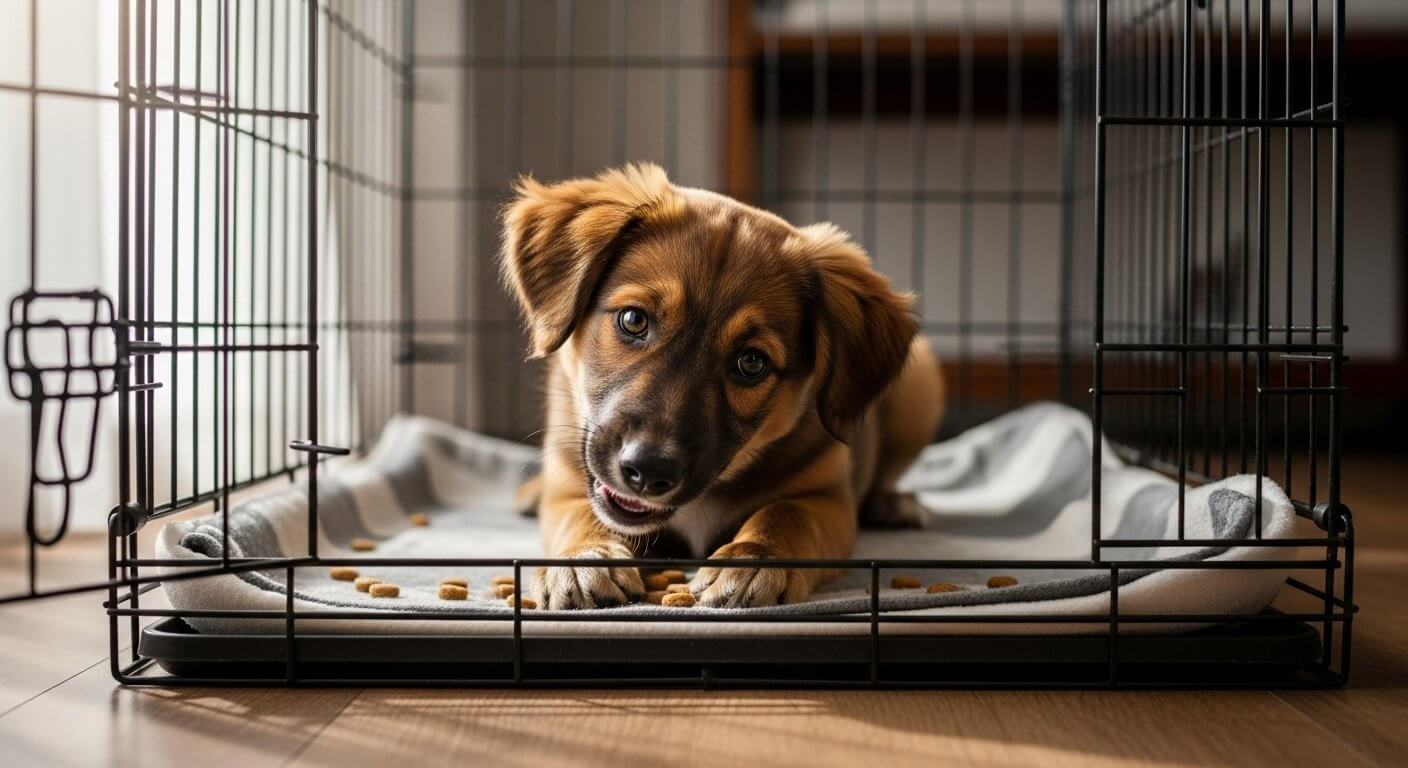
Make the crate a fun game! Toss high-value treats inside and praise your puppy enthusiastically every time they go in to get them. Leave the door open. Repeat this for several short, happy sessions.
Feed All Meals in the Crate
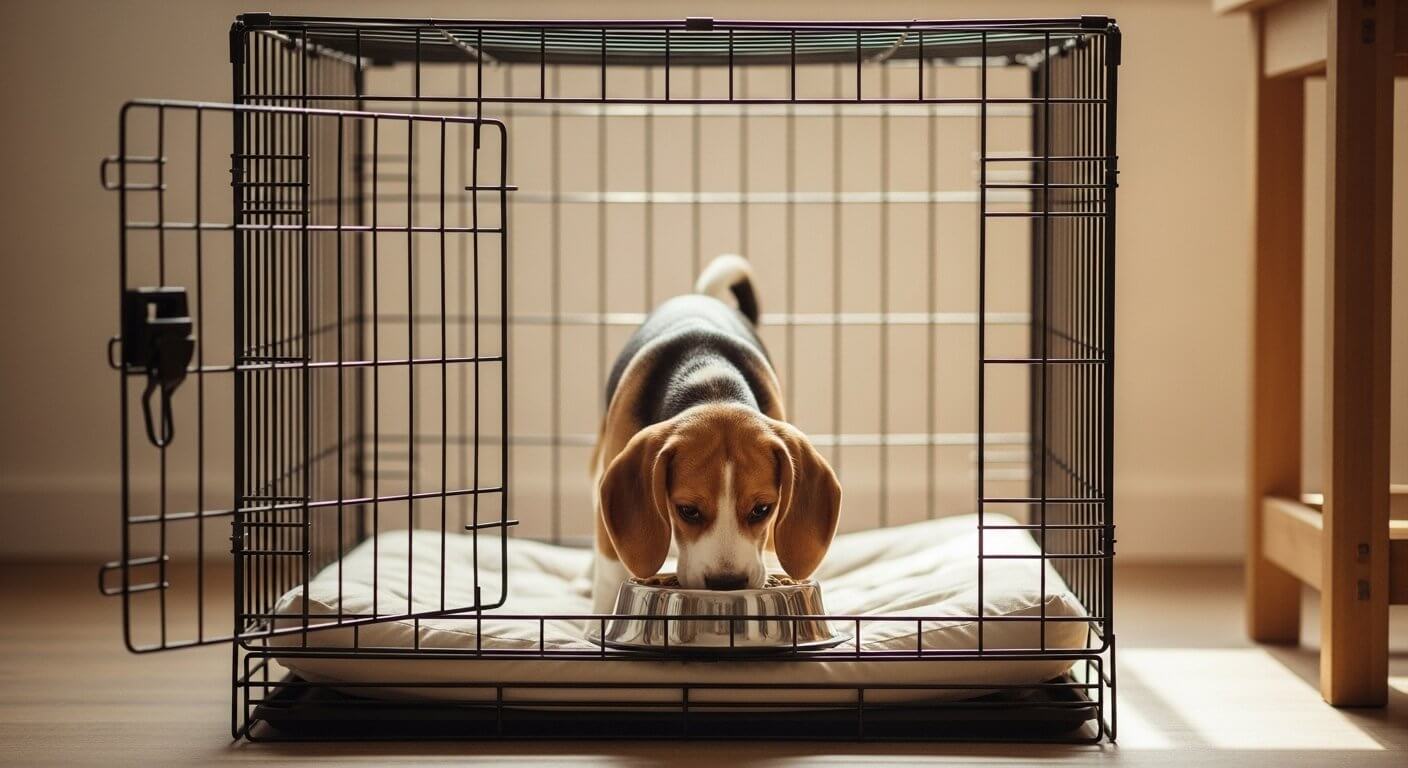
Start placing your puppy’s food bowl at the back of the crate for every meal. At first, leave the door open. Once they are comfortable, you can close the door for a few seconds while they eat, opening it before they finish.
Practice Short Durations
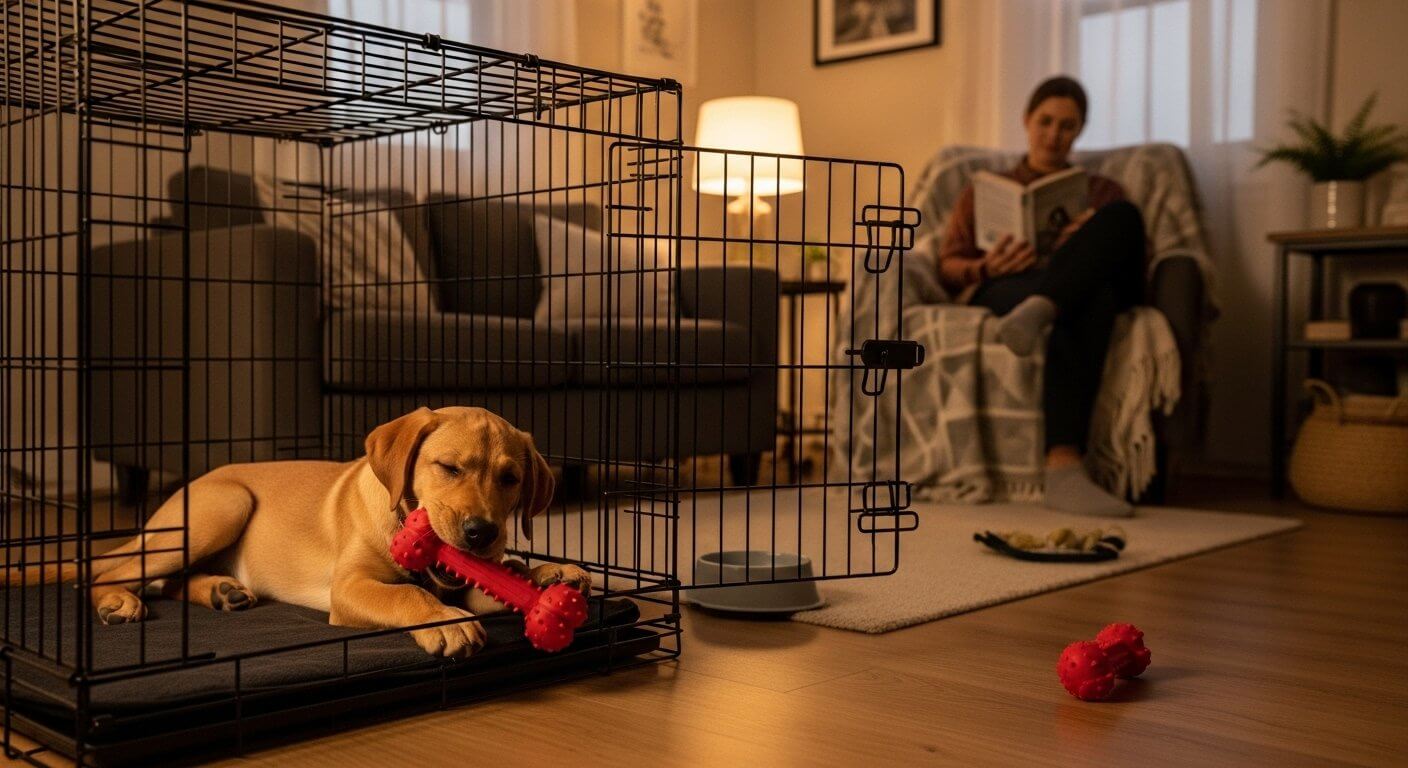
Once your puppy is happy being in the crate, ask them to go in, give them their special crate-only chew toy, and close the door for just 1-2 minutes while you stay in the room. Gradually increase the duration over many sessions.
The Perfect Crate Setup: Location, Covers & Contents
Setting up the crate correctly is half the battle. A bare wire box is not inviting. Let’s build a proper den.
✅ Best Locations:
- Your bedroom (especially for the first few weeks)
- A quiet corner of the living room
- An area with family traffic but not in a direct path
❌ Avoid These Locations:
- Isolated laundry room or basement
- Near noisy appliances
- In direct sunlight or drafty areas
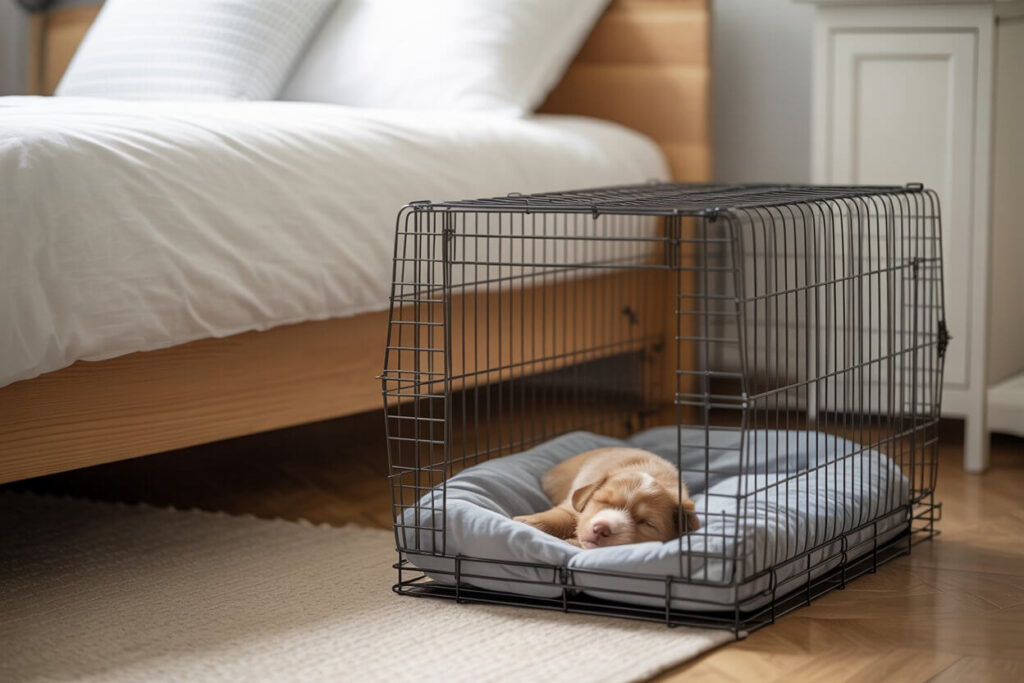
Does putting a blanket over a dog crate help?
Yes, for most puppies, a cover is a game-changer. It creates that dark, secure den-like atmosphere that helps them settle. Just be sure to use a breathable, purpose-made cover and ensure there is still plenty of ventilation.
Why it’s a must-have: This cover transforms a wire box into a cozy, secure den. The breathable fabric blocks out distracting sights and sounds, signaling to your puppy that it’s time to settle down and rest, while the mesh windows ensure proper airflow.
What Should (and Shouldn’t) Go in the Crate?
What you put inside the crate is just as important as where you put the crate itself. Here’s a quick guide.
- Bedding: A durable, chew-resistant, and washable crate pad provides comfort. Avoid fluffy beds that a puppy could shred and ingest.
- Toys: Always provide a safe, durable chew toy that is reserved *only* for crate time. This builds a powerful positive association. Avoid soft toys or anything that can be easily destroyed.
- Water: It’s generally not recommended to leave water in the crate overnight for young puppies to avoid accidents. Ensure they are well-hydrated before bedtime.
- Pee Pads: Never put a pee pad in the crate. This teaches your puppy that it’s okay to eliminate in their den, which completely undermines potty training.
Why it’s a great choice: This pad is a perfect first bed. It’s not overly plush, making it safer for chew-happy puppies, and the self-warming material reflects your pup’s own body heat to create a soothing, cozy surface that encourages sleep.
Why it’s my go-to crate toy: This is more than a toy; it’s a job. You can freeze treats inside, and it keeps a puppy occupied and happy for a long time. Giving this as a “crate-only” treat builds a powerful positive association and makes them eager to go in.
How Long Should I Let My Puppy Bark? The Critical Answer
This is the question every sleep-deprived owner asks. The answer depends on the type of noise your puppy is making. As experts at Ohio State University advise, you must learn to distinguish between minor protest whining and genuine distress barking.
Protest Whining vs. Distress Barking: A Critical Distinction
Protest Whining (Okay to ignore briefly):
- Intermittent whining that fades after 5-10 minutes.
- Puppy settles between whining episodes.
- No signs of panic or frantic behavior.
Distress Barking (Intervene immediately):
- Continuous, frantic barking or howling.
- Puppy is actively trying to escape the crate (digging, biting bars).
- Signs of panic like heavy panting, drooling, or frantic movement.
Should I ignore my puppy barking at night?
This is one of the most common questions I receive, and for good reason. The answer depends entirely on the type of barking you’re hearing. As we just discussed, brief protest whining can be ignored for 5-10 minutes to see if your puppy will settle on their own. However, you should never let a puppy in genuine distress “cry it out.” This can create lifelong anxiety. If you see signs of distress, calmly take them for a boring potty break, then reassess. You may need to go back to earlier, easier crate training steps.
Crate Training by Age: What to Expect
8-10 Week Old Puppies
At this age, puppies can typically hold their bladder for only 2-3 hours. They are also experiencing their first time away from their mother and littermates, so some separation anxiety is normal and expected.
- Maximum crate time: 2-3 hours during the day, 3-4 hours at night (with potty breaks).
- Common issues: Loneliness, frequent potty needs.
- Solution: Keep the crate in your bedroom, use a comfort item like a Snuggle Puppy, and set an alarm for at least one nighttime potty break.
Why it’s a game-changer for young puppies: This is my #1 recommendation for easing separation anxiety. The simulated “real-feel” heartbeat and warmth mimic a puppy’s mother and littermates, providing a profound sense of comfort that can dramatically reduce nighttime crying.
4 Month Old Puppies
At four months, puppies are more confident but are also entering adolescence and may start testing boundaries. Teething discomfort can also increase restlessness and chewing.
- Maximum crate time: 4-5 hours during the day, 6-7 hours at night.
- Common issues: Boundary testing, teething discomfort, increased energy.
- Solution: Maintain a consistent routine, provide safe and durable chew toys in the crate, and ensure they get adequate exercise before being crated.
What to Do When Your Puppy Suddenly Starts Barking in the Crate
If your previously quiet puppy suddenly starts barking in the crate again, it’s a sign that something has changed. Here are the most common causes:
- Developmental Stage: Puppies often go through fear periods (around 4-6 months and again in adolescence) where they can become newly anxious about being alone.
- Discomfort: Teething pain or a hidden medical issue could be making the crate uncomfortable.
- Routine Change: Any change in your schedule can trigger insecurity and lead to barking.
The solution is to go back to basics. Revisit the positive association games, shorten the duration in the crate, and rule out any medical issues with your veterinarian.
What Other Puppy Owners Are Saying
I monitor various puppy training communities to understand common challenges and solutions. Here are some insights from thousands of puppy owners who’ve dealt with crate barking:
Most Common Success Strategies:
- “The Snuggle Puppy toy with the heartbeat was a complete game-changer for our 8-week-old. He settled down almost immediately.” – Sarah, Golden Retriever owner
- “Moving the crate to our bedroom stopped the nighttime crying immediately. It was the best advice we got.” – Mike, Labrador owner
- “Feeding all his meals in the crate made our puppy actually look forward to going in.” – Jen, Beagle owner
Common Mistakes to Avoid:
- “I made the mistake of letting him out whenever he cried, and it took weeks to fix.” – Tom, German Shepherd owner
- “We tried the ‘cry it out’ method and it created severe anxiety.” – Lisa, mixed breed owner
Frequently Asked Questions
Should I lock my puppy in his crate at night?
Yes, for safety and potty training, the crate door should be securely latched at night. This prevents the puppy from wandering, getting into trouble, or having accidents around the house while you are asleep.
How long does it take to crate train a puppy?
Be patient. Building a strong, positive association with the crate is a gradual process that can take several days or even weeks of consistent, short, and happy training sessions. Rushing the process is the number one cause of crate-related anxiety.
Are playpens good for puppies?
Yes, playpens are an excellent tool, especially for longer absences like a workday. They provide a larger, safe, puppy-proofed area where you can leave water and a potty pad, which is not recommended for a crate.
Do vets recommend dog crates?
Yes, the vast majority of veterinarians and certified trainers recommend crate training as a safe, effective management tool. They recognize its benefits for potty training, travel, and providing a dog with a secure space of their own.
Are dogs happy in crates?
When introduced correctly using positive reinforcement, yes! A dog who sees their crate as their personal den will happily go in to rest, chew on a toy, and sleep. It becomes their safe retreat from a busy household.
Should I ignore my puppy barking at night?
This is one of the most common questions I receive, and for good reason. The answer depends entirely on the type of barking you’re hearing. As we discussed above, brief protest whining can be ignored for 5-10 minutes, but distress barking requires immediate intervention.
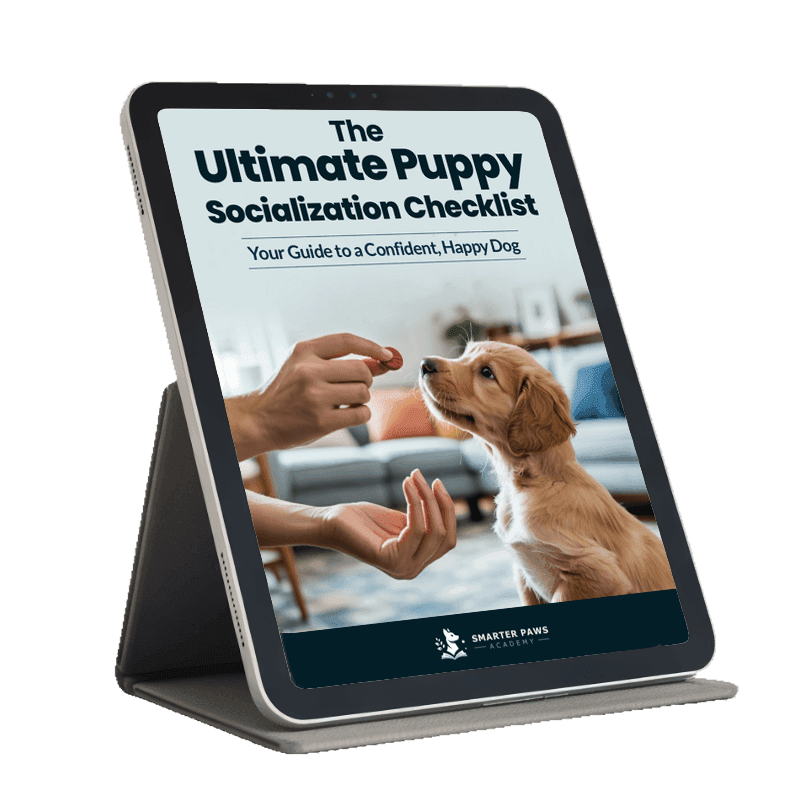
Give Your Puppy the Best Start in Life
Don’t leave socialization to chance. Get our free, certified trainer-approved checklist for a step-by-step guide to raising a confident, happy dog.
From a Crying Pup to a Confident Companion
Teaching a puppy to be comfortable in their crate is a true act of love. It’s an investment in their future safety, your peace of mind, and a lifetime of peaceful nights. Remember to be patient, stay positive, and celebrate the small victories. By transforming the crate from a scary box into a wonderful, safe den, you are giving your puppy a foundational skill that will serve them for the rest of their life. You can do this, and the silent nights are worth it.






